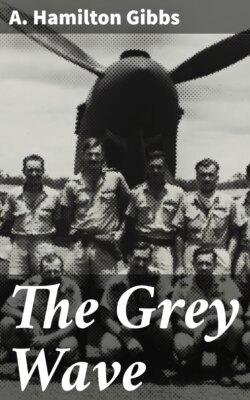Читать книгу The Grey Wave - A. Hamilton Gibbs - Страница 9
4
ОглавлениеMy new-found “brother’s” name was Bucks. After a few more days of drilling and marching and sergeant grilling, we both got khaki and spurs and cap badges and bandoliers, and we both bought white lanyards and cleaning appliances. Smart? We made a point of being the smartest recruits of the whole bunch. We felt we were the complete soldier at last and although there wasn’t a horse in Woolwich we clattered about in spurs that we burnished to the glint of silver.
And then began the second chapter of our military career. We all paraded one morning and were told off to go to Tidworth or the Curragh.
Bucks and I were for Tidworth and marched side by side in the great squad of us who tramped in step, singing “Tipperary” at the top of our lungs, down to the railway station.
That was the first day I saw an officer, two officers as a matter of fact, subalterns of our own regiment. It gave one for the first time the feeling of belonging to a regiment. In the depot at Woolwich were 9th Lancers, 5th Dragoon Guards, and 16th Lancers. Now we were going to the 9th Lancer barracks and those two subalterns typified the regiment to Bucks and me. How we eyed them, those two youngsters, and were rather proud of the aloof way in which they carried themselves. They were specialists. We were novices beginning at the bottom of the ladder and I wouldn’t have changed places with them at that moment had it been possible. As an officer I shouldn’t have known what to do with the mob of which I was one. I should have been awkward, embarrassed.
It didn’t occur to me then that there were hundreds, thousands, who knew as little as we did about the Army, who were learning to be second lieutenants as we were learning to be troopers.
We stayed all day in that train, feeding on cheese and bread which had been given out wrapped in newspapers, and buns and biscuits bought in a rush at railway junctions at which we stopped from time to time. It was dark when we got to Tidworth, that end-of-the-world siding, and were paraded on the platform and marched into barracks whose thousand windows winked cheerily at us as we halted outside the guardroom.
There were many important people like sergeant-majors waiting for us, and sergeants who called them “sir” and doubled to carry out their orders. These latter fell upon us and in a very short time we were divided into small groups and marched away to barrack rooms for the night. There was smartness here, discipline. The chaos of Woolwich was a thing of the past.
Already I pictured myself being promoted to lance-corporal, the proud bearer of one stripe, picking Boches on my lance like a row of pigs,—and I hadn’t even handled a real lance as yet!
